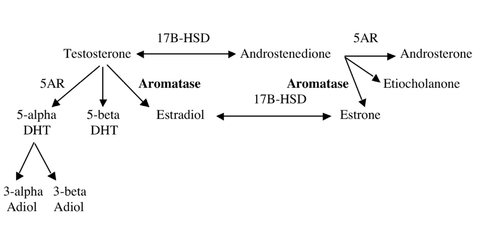If you're a man, you're probably always looking to bio hack ways in maintaining or increasing your testosterone levels.
If you're a woman, you might have been misdirected and told that testosterone is the male hormone, meaning too much of it can cause some unwanted side effects, but the reality of it is that testosterone is just as important in women- particularly as you age.
What are the common notions people think of when testosterone is mentioned?
Increased libido, strength gains, deeper voice, hair growth- and sure, the hormone in itself can help with all of that, but there is so much more to it!
The main benefits in producing healthy levels of this particular androgen are:
- It helps protect and maintain the strength of our bone density
- Supports cognitive function and brain health
- Supports fat distribution
- Increases the ease to gain and maintain muscle
- Increases mood and energy levels
- Helps with the production of red blood cells by stimulating erythropoiesis in the bone marrow
- Maintains a healthy level and cycle of libido
- Helps with the production of sperm in men
- Heps with the development of follicles in women

Except for the last two points, all of these directly affect both men and women, hence the value of producing adequate levels through out our life is imperative. Question now, is just how do we do that? Is there really a way to maintain or increase testosterone levels naturally?
First, let's try and understand how the hormone itself is produced.
It all starts within our hypothalamus which releases gonadotropin releasing hormone (GnRH), which sends a signal to our pituitary gland to release luteinizing hormone (LH). Once that LH is produced, it travels through the blood stream to reach the gonads and communicates to the cells in that organ (whether it be the ovaries or testes) to make testosterone. However, that isn't the only place where we produce testosterone. We also make it in our adrenal glands and fat tissue (to a certain extent). Pregnenolone is the main catalyst to this chain reaction coming from the adrenal glands. From there, we produce an androgen called DHEA, which then makes androstenedione, and finally we get some testosterone.

The important thing to remark here is that despite the fact that we produce much of our testosterone in our gonads in our fertile years, once we reach andropause and menopause, our adrenals take over. This is why it is so important to regulate the nervous system and stress response that our body experiences in times of stress so it doesn't compensate in prioritizing other functions, directly then hindering the production of testosterone.
Conversely, there is a process called aromatization, which is when testosterone is converted into estrogen. The act of aromatization typically occurs as we age, if there is excess fat tissue on the body, there is blood sugar dysregulation, too little protein in the diet, chronic stress, lack of muscle mass, poor thyroid function (particularly hypothyroid), environmental toxins or xenoestrogens that exacerbate estrogen conversion, heavy metals, or excess iron within the tissues. This isn't good because it can lead to excess growths such as cancer.

Everyone is susceptible to this, there is no avoiding it, however we can optimize our surroundings and our selves so we can preserve testosterone levels and stop the process of aromatization in occurring by being mindful of the triggers.
Understand that testosterone, just like estrogen and progesterone, are our main steroid hormones and their main function is for fertility. In comprehending that our steroid hormones are chemical messengers to our cells that are primarily produced when the body feels it is safe to reproduce, we then have a job to respect the environment our bodies need to feel such a way.
So what are ways we can help support our bodies in continuing to make testosterone?
- Manage the nervous system and look to our Ca:P ratio on an HTMA
- Focus on not over stimulating the adrenals and getting in enough minerals for them like sodium, potassium and vitamin C
- Maintaining healthy thyroid function which can we seen through the HTMA ratio Ca:K
- Balancing blood sugar through out the day
- Exercising and prioritizing strength training over cardio
- Eating enough protein, aiming for 0.8-1g per pound of body weight
- Avoiding xenoestrogens in the environment and personal products
- Learning to let go of stress that is inconducive to you
If you feel like your testosterone levels are things you may be struggling with, we highly considering running a hair test with us by clicking the following link here and keeping an eye out for something very special coming out soon!
We are first and foremost a mineral company, but don't think we haven't been listening to your hormonal troubles! Keep an eye out and stay tuned for a big surprise coming December 18, 2022!


